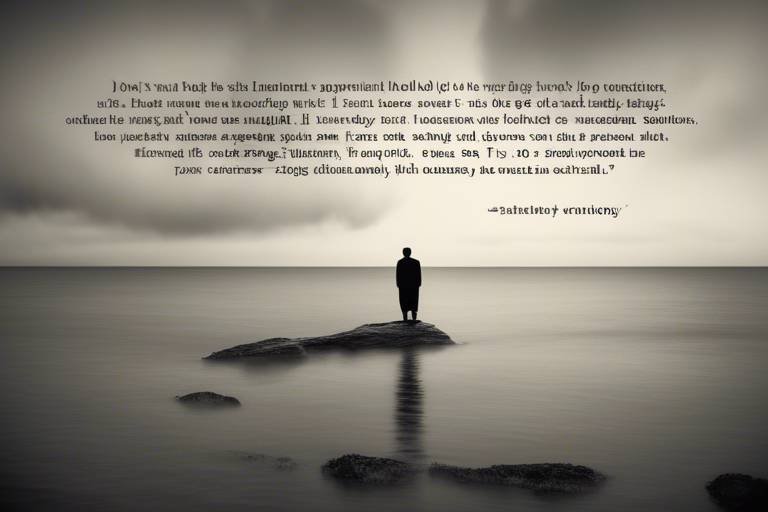Deciphering the Abstract Nature of Reality Through Ontology
Have you ever found yourself pondering the very essence of existence? What does it mean to "be"? These questions delve into the realm of ontology, a branch of philosophy that seeks to unravel the complexities of reality and the nature of being. In a world filled with distractions and superficial understandings, ontology invites us to dig deeper, to challenge our perceptions, and to explore the foundational structures that underpin our understanding of reality.
At its core, ontology is concerned with the categorization of existence. It asks not just "What exists?" but also "What does it mean to exist?" This philosophical inquiry has a rich history, with roots tracing back to ancient thinkers who laid the groundwork for contemporary discussions. By examining ontology, we can uncover the nuances of how different philosophical perspectives shape our understanding of the world around us.
Imagine standing at the edge of a vast ocean, where each wave represents a different philosophical viewpoint on reality. Some waves crash with the force of Aristotle's substance theory, while others ripple gently with the ideas of Kant's transcendental idealism. Each wave contributes to the larger body of water, creating a complex interplay of thoughts and ideas that challenge our understanding of existence.
This article will take you on a journey through the intricate landscape of ontology, exploring key thinkers and their contributions, as well as the ongoing debates that shape our understanding of reality today. From the ancient Greeks to modern physicists, the exploration of ontology is not just an academic exercise; it is a vital inquiry into the nature of our existence and our place in the universe.
By engaging with these ideas, we can begin to appreciate the profound implications of ontology on our lives. Whether it’s in our personal experiences or the scientific endeavors that seek to explain the universe, the questions raised by ontology are fundamental to our understanding of everything from the smallest particles to the vast cosmos. So, let’s embark on this philosophical adventure together, and see how ontology can illuminate the abstract nature of reality.
- What is ontology?
Ontology is the philosophical study of the nature of being, existence, and reality. It explores what entities exist and how they can be categorized and related within a hierarchy. - Why is ontology important?
Ontology is crucial because it helps us understand the fundamental structures of reality, influencing fields such as science, metaphysics, and even everyday decision-making. - How do different philosophers view ontology?
Different philosophers have unique perspectives on ontology. For example, Aristotle focused on substance and essence, while Kant emphasized the role of perception in our understanding of reality. - What role does ontology play in science?
Ontology influences scientific theories by shaping the assumptions about what constitutes reality, affecting how empirical data is interpreted and understood.

The Foundations of Ontology
Ontology, at its core, is the philosophical study of being and existence. It seeks to answer profound questions about what it means to be and what kinds of entities exist in our world. Think of ontology as the *blueprint* of reality, outlining the fundamental categories and relationships that define our understanding of existence. Historically, ontology has roots that stretch back to ancient philosophy, where thinkers like Plato and Aristotle began to explore these concepts. Their inquiries laid the groundwork for centuries of debate and exploration into the nature of being.
As we delve deeper into ontology, we uncover its significance not just in philosophy, but also in various fields such as science, linguistics, and even artificial intelligence. The questions ontology grapples with are not merely academic; they resonate with our everyday experiences. For instance, when we categorize objects in our environment, we are engaging in an ontological exercise—deciding what is real and what is not. This process is essential for making sense of our world, and it influences how we interact with it.
To better understand the foundations of ontology, we can identify several key principles that guide its study:
- Existence: What does it mean for something to exist? Is existence a property of objects, or is it a more complex relationship?
- Categories of Being: How do we classify different types of entities? Are there fundamental categories that underlie everything else?
- Identity and Change: How do we understand the identity of an object over time? What does it mean for something to remain the same despite changes?
These principles help frame the ongoing discussions and debates within ontology, as philosophers strive to clarify and refine our understanding of existence. As we explore these foundational elements, we see that ontology is not just a dry academic discipline; it is a vibrant field that challenges us to reconsider our assumptions about reality.
In summary, the foundations of ontology provide a lens through which we can examine the very fabric of existence. By engaging with these principles, we not only gain insights into philosophical thought but also enhance our comprehension of the world around us. As we continue this journey, we will encounter influential philosophers who have shaped these ideas and contributed to our understanding of reality.

Key Philosophers and Their Contributions
The realm of ontology has been significantly shaped by a handful of brilliant philosophers whose ideas continue to resonate through contemporary thought. These thinkers have not only enriched our understanding of existence but have also sparked debates that challenge our perceptions of reality. Let's take a closer look at three pivotal figures: Aristotle, Kant, and Heidegger. Each of these philosophers brought a unique lens through which we can explore the intricate tapestry of being and existence.
Aristotle, often hailed as the father of Western philosophy, introduced a concept known as substance theory. For him, substance is what makes an object what it is; it is the essence that underlies all physical manifestations. Imagine a tree: while its leaves, branches, and trunk may change with the seasons, its essence—the 'tree-ness'—remains constant. This foundational idea has influenced not just philosophy but also the sciences. Aristotle argued that understanding substances allows us to grasp the fundamental nature of reality. His work laid the groundwork for future explorations into metaphysics, prompting questions about what it means to exist and how we categorize the world around us.
Fast forward to the 18th century, and we encounter Immanuel Kant, whose philosophy introduced a revolutionary perspective known as transcendental idealism. Kant proposed that our understanding of reality is not merely a passive reflection of the world but is actively shaped by our perceptions and cognitive structures. Think of it like a pair of tinted glasses; the world you see is influenced by the color of the lenses you wear. According to Kant, while we can know phenomena (the world as we perceive it), the noumena (the world as it truly is) remains elusive. This idea emphasizes the limitations of human knowledge and raises profound questions about the nature of existence itself. Kant's work has been pivotal in bridging the gap between empirical science and metaphysical inquiry.
Then we have Martin Heidegger, whose seminal work, Being and Time, delves deep into the question of being itself. Heidegger challenges us to consider not just what things are, but what it means to be. He introduces the concept of Dasein, which refers to the experience of being that is unique to humans. Dasein is always situated in time, and this temporal aspect is crucial for understanding our existence. Heidegger’s existential ontology reveals that our relationship with the world is dynamic and intertwined with our experiences, choices, and the passage of time. His thoughts encourage us to reflect on our own existence and how we relate to the world around us, making us question our place in the grand scheme of things.
These philosophers have laid the groundwork for ongoing discussions in ontology, each contributing a unique perspective that challenges and enriches our understanding of reality. Their ideas serve as a springboard for contemporary debates, pushing us to reconsider the nature of existence and the frameworks through which we interpret our world.
| Philosopher | Key Contribution | Core Idea |
|---|---|---|
| Aristotle | Substance Theory | Essence of objects defines their existence |
| Kant | Transcendental Idealism | Reality is shaped by our perceptions |
| Heidegger | Being and Time | Focus on the experience of being |

Aristotle's Substance Theory
Aristotle's Substance Theory is a cornerstone of his philosophical outlook, establishing a framework that has profoundly influenced Western thought. At its core, this theory posits that substances are the fundamental realities of the world, serving as the primary entities that exist independently. But what does this really mean? To put it simply, Aristotle believed that everything around us—be it a tree, a rock, or even a human being—can be understood as a substance that possesses both form and matter. This duality is crucial; it suggests that substances are not just physical objects but also embody specific qualities and purposes.
Aristotle categorized substances into two main types: primary substances, which are individual entities like a particular dog or a specific tree, and secondary substances, which refer to the species or genus to which these entities belong. For instance, while "Fido" represents a primary substance, "dog" is a secondary substance that groups Fido with other dogs. This distinction is vital because it helps us understand the relationships between entities and how they interact within the broader context of existence.
Moreover, Aristotle introduced the concept of essence, which refers to the intrinsic nature or indispensable quality of a substance that determines what it is. This essence is what makes a substance recognizable and distinct from others. For example, the essence of a dog encompasses its characteristics—like barking, wagging its tail, and having four legs—that differentiate it from a cat or a bird. In Aristotle's view, understanding a substance's essence is crucial for comprehending its existence and purpose in the world.
To illustrate Aristotle's Substance Theory further, consider the following table that outlines the key components:
| Component | Description |
|---|---|
| Primary Substance | Individual entities that exist independently (e.g., a specific person or animal). |
| Secondary Substance | Categories or classifications that encompass primary substances (e.g., species or genus). |
| Essence | The intrinsic nature or quality that defines a substance and distinguishes it from others. |
Aristotle's approach was revolutionary for its time, as it shifted the focus from abstract forms to tangible realities. This emphasis on substance laid the groundwork for later philosophical inquiries into existence, influencing not only metaphysics but also areas like ethics and epistemology. Think of it like building a house; without a solid foundation, the structure would crumble. Similarly, without a clear understanding of substances, our grasp of reality would be shaky at best.
In conclusion, Aristotle's Substance Theory offers a profound insight into the nature of being, highlighting how our understanding of existence is intricately linked to the substances that populate our world. By categorizing substances and examining their essences, we can better appreciate the complexity of reality and our place within it. This inquiry into the fundamental nature of existence continues to resonate, encouraging modern thinkers to explore the depths of ontology in their quest for understanding.
- What is the main idea of Aristotle's Substance Theory?
Aristotle's Substance Theory posits that substances are the fundamental realities of the world, consisting of individual entities (primary substances) and their classifications (secondary substances). - How does essence relate to substances?
Essence refers to the intrinsic nature of a substance that determines what it is, helping to distinguish it from other substances. - Why is Aristotle's theory significant?
It laid the groundwork for later philosophical inquiries into existence and has influenced various fields, including metaphysics and ethics.

Kant's Transcendental Idealism
When we dive into the world of , we are stepping into a realm where our perceptions play a pivotal role in shaping our understanding of reality. Kant, a towering figure in philosophy, argued that while the world exists independently of our perceptions, our knowledge of that world is filtered through our senses and cognitive structures. This means that what we perceive is not the thing-in-itself, but rather a representation shaped by our minds. It’s like looking at a beautiful painting; the colors and strokes are real, but the emotions and interpretations they evoke are uniquely ours.
Kant proposed that our experiences are structured by innate categories of understanding, which he referred to as transcendental categories. These categories include concepts like time, space, and causality, which are not merely external features of the world but are fundamental frameworks through which we interpret our experiences. Imagine trying to assemble a puzzle without the picture on the box – these categories provide that essential image, guiding us in piecing together the complex tapestry of existence.
One of the most compelling aspects of Kant's philosophy is his insistence on the limitations of human knowledge. He famously stated, “We can never know the things-in-themselves,” which implies that there are aspects of reality that remain forever beyond our grasp. This leads us to a fascinating paradox: while we can construct elaborate theories and models of the universe, we are ultimately confined to our subjective experiences. Kant's work invites us to reflect on the nature of reality and our place within it, challenging us to consider how much of what we know is shaped by our own perspectives.
To illustrate Kant's ideas more clearly, let’s consider a simple table that highlights the differences between the phenomenal world (the world as we experience it) and the noumenal world (the world as it exists independently of our perceptions):
| Phenomenal World | Noumenal World |
|---|---|
| Subjective perceptions | Objective reality |
| Constructed through human experience | Exists independently of human thought |
| Accessible through senses and intuition | Inaccessible to human understanding |
In essence, Kant's Transcendental Idealism serves as a bridge between the empirical world and the abstract concepts that govern our understanding of existence. It compels us to recognize that while we seek knowledge and truth, we must also acknowledge the filters through which we view the world. This perspective not only enriches our philosophical discourse but also enhances our appreciation for the complexity of reality itself.
- What is Transcendental Idealism?
Transcendental Idealism is a philosophical theory proposed by Immanuel Kant, which posits that our understanding of the world is shaped by our perceptions and cognitive structures, rather than being a direct reflection of reality. - How does Kant differentiate between the phenomenal and noumenal worlds?
Kant distinguishes between the phenomenal world, which is the world as we experience it through our senses, and the noumenal world, which is the reality that exists independently of our perceptions and is ultimately unknowable. - Why is Kant's philosophy significant today?
Kant's philosophy remains significant as it challenges our understanding of knowledge, reality, and existence, influencing various fields including metaphysics, epistemology, and even science.

Heidegger's Being and Time
When we dive into Martin Heidegger's seminal work, Being and Time, we are not just skimming the surface of philosophical thought; we are plunging into the depths of what it means to exist. Heidegger challenges us to reconsider our understanding of being itself. He posits that the essence of our existence is intertwined with time, suggesting that to grasp the concept of "being," we must first confront the temporal nature of our lives. This is not just a philosophical exercise; it’s a profound inquiry into the very fabric of our daily experiences and interactions.
Heidegger introduces us to the term Dasein, which translates to "being-there." This term encapsulates the human experience, emphasizing our presence in the world and our ability to reflect on that presence. Dasein is unique because it is not merely a static entity; it is dynamic, constantly evolving as we navigate our environments and relationships. In this sense, Heidegger invites us to see ourselves not as isolated beings but as participants in a larger tapestry of existence, where our choices and actions resonate through time.
One of the most striking aspects of Being and Time is Heidegger's exploration of being-toward-death. He argues that our awareness of mortality profoundly shapes our understanding of life. This awareness compels us to confront the choices we make and the authenticity of our existence. Are we living genuinely, or are we merely conforming to societal expectations? This question reverberates throughout his work, urging us to embrace our freedom and take responsibility for our own lives.
In addition to these themes, Heidegger also delves into the concept of thrownness, which refers to the idea that we are "thrown" into a world we did not choose. This notion highlights the unpredictability of life and the constraints we face. However, rather than viewing thrownness as a limitation, Heidegger encourages us to see it as an opportunity for authenticity. By acknowledging our circumstances, we can forge our own paths and create meaning in a seemingly indifferent universe.
Heidegger's existential ontology has sparked a multitude of interpretations and debates, influencing various fields beyond philosophy, including psychology, literature, and even theology. His ideas challenge us to contemplate not just what it means to exist but how we engage with our existence in a world that often seems chaotic and uncertain.
As we ponder Heidegger's insights, we are left with essential questions about our own lives: Are we truly aware of our own being? How does our understanding of time shape our experiences? In a world that often prioritizes productivity over reflection, Heidegger’s work serves as a powerful reminder of the importance of engaging with our own existence and the world around us.
- What is Dasein? Dasein is a term used by Heidegger to describe the experience of being human, emphasizing our presence and engagement in the world.
- How does Heidegger relate being to time? Heidegger argues that our understanding of being is deeply connected to our temporal existence; our experiences are shaped by our awareness of time and mortality.
- What is thrownness in Heidegger's philosophy? Thrownness refers to the idea that we are placed into a world we did not choose, which influences how we navigate our existence and authenticity.

Contemporary Ontological Debates
In the ever-evolving landscape of philosophy, contemporary ontological debates are at the forefront of discussions regarding the nature of reality. These debates are not just academic exercises; they resonate deeply with our everyday experiences and perceptions of the world. One of the most significant discussions centers around the dichotomy of realism and anti-realism. But what do these terms really mean? In essence, realism asserts that there exists an objective reality independent of our perceptions, while anti-realism posits that our understanding of reality is fundamentally shaped by social constructs and subjective experiences.
Imagine standing on a beach, feeling the sand between your toes and listening to the waves crash against the shore. A realist would argue that the beach exists whether or not you are there to witness it. In contrast, an anti-realist might suggest that your experience of the beach is shaped by your memories, emotions, and cultural background, thus questioning the notion of an objective reality. This brings us to the crux of contemporary debates: how do our perceptions influence our understanding of existence?
Another critical area of discussion involves the implications of these ontological views on various fields, including ethics, science, and metaphysics. For instance, if we lean towards anti-realism, can we truly claim that moral values exist independently of human thought? This is a question that has sparked intense debate among philosophers and ethicists alike.
Moreover, contemporary ontological discussions have also taken a fascinating turn with the advent of technology and digital realities. With the rise of virtual realities and digital environments, philosophers are now grappling with questions like:
- What does it mean for something to exist in a digital space?
- Can virtual objects be considered real?
- How do these new forms of existence challenge traditional ontological categories?
These inquiries open up a Pandora's box of possibilities, pushing the boundaries of what we consider to be "real." Philosophers today are not just confined to dusty tomes; they are engaging with modern phenomena that challenge our very understanding of existence. The discussions are vibrant, filled with passion and diverse perspectives, making it an exciting time to delve into ontology.
As we navigate through these debates, one thing becomes clear: ontology is not a static field but a dynamic conversation that reflects our changing understanding of reality. It’s a reminder that our quest for knowledge is ongoing, and the questions we ask today will shape the philosophical landscape of tomorrow.
- What is ontology?
Ontology is the branch of philosophy that studies the nature of being, existence, and reality. - What are realism and anti-realism?
Realism posits that an objective reality exists independent of our perceptions, while anti-realism suggests that our understanding of reality is shaped by subjective experiences. - How do contemporary ontological debates influence other fields?
These debates impact ethics, science, and metaphysics by challenging our assumptions about existence and knowledge. - What role does technology play in contemporary ontology?
Technology, especially digital realities, raises new questions about existence and challenges traditional ontological categories.

Ontology and Science
When we think about ontology, we're often drawn into the depths of philosophical inquiry, but its implications stretch far beyond abstract thought. It intersects intriguingly with the realm of science, where questions of existence and reality become crucial. At its core, ontology deals with the nature of being, and in science, understanding what exists and how we can interact with it is fundamental. Have you ever wondered how our beliefs about what is 'real' influence our scientific discoveries? This relationship is not just a matter of curiosity; it shapes the frameworks within which we conduct research and interpret data.
One of the most fascinating aspects of this intersection is how ontological assumptions can dictate scientific theories. For instance, when scientists propose a theory, they often make implicit assumptions about the nature of reality. These assumptions can range from the existence of unobservable entities, like quarks in particle physics, to the belief that the universe operates under consistent laws. The way we understand these entities can dramatically influence our scientific models and experiments. Let’s consider a few key points:
- Scientific Models: These are built on ontological assumptions about what exists. For example, the existence of electrons is taken for granted in many physical theories.
- Interpretation of Data: How we interpret empirical data can change based on our ontological stance. A realist might see data as revealing truths about an objective reality, while a constructivist may view it as a product of social contexts.
- Research Directions: The questions scientists choose to pursue often reflect their underlying ontological beliefs. If a scientist believes in a deterministic universe, they might focus on uncovering universal laws.
This interplay raises essential questions: How do our ontological views shape the scientific questions we ask? And conversely, how does scientific progress affect our understanding of existence? As we delve deeper into these questions, we find ourselves at the crossroads of philosophy and empirical inquiry, where each discipline informs the other.
Within the scientific community, there's an ongoing debate between scientific realism and constructivism. Scientific realism posits that an objective reality exists independently of our perceptions. In this view, scientific theories aim to describe this reality accurately. On the other hand, constructivism argues that our understanding of reality is shaped by social processes and cultural contexts. This tension is not just academic; it has practical implications for how we conduct research and apply scientific findings in the real world.
To illustrate the differences, consider the following table:
| Aspect | Scientific Realism | Constructivism |
|---|---|---|
| Nature of Reality | Exists independently of our thoughts | Constructed through social processes |
| Objective Truth | Can be discovered through science | Subjective and varies by context |
| Role of Theories | Reflects true nature of reality | Frameworks for understanding social phenomena |
Both perspectives offer valuable insights, but they also highlight the complexities of interpreting scientific findings. As we navigate through these discussions, it's essential to recognize that our ontological views can profoundly influence not only our understanding of science but also the way we engage with the world around us.
Quantum physics, perhaps more than any other field, exemplifies the challenges posed by ontological questions. Traditional notions of reality are challenged at the quantum level, where particles can exist in multiple states simultaneously, a phenomenon known as superposition. This leads to the question: what does it mean for something to 'exist' in such a context? Does it exist in a definite state, or is its existence contingent upon observation? These ontological dilemmas push the boundaries of our understanding and compel us to rethink our foundational beliefs about reality.
In conclusion, the relationship between ontology and science is a rich tapestry of inquiry that continues to evolve. As we explore these connections, we not only deepen our understanding of existence but also enhance the frameworks through which we engage with scientific discovery.
Q1: What is ontology?
Ontology is the branch of philosophy that studies the nature of being, existence, and reality. It seeks to understand what entities exist and how they can be categorized and related within a hierarchy.
Q2: How does ontology relate to science?
Ontology influences scientific inquiry by shaping the assumptions scientists make about what exists in the universe. These assumptions can affect the development of theories and the interpretation of empirical data.
Q3: What are scientific realism and constructivism?
Scientific realism posits that an objective reality exists independently of our perceptions, while constructivism argues that our understanding of reality is shaped by social contexts and cultural influences.

Scientific Realism vs. Constructivism
When we dive into the realms of scientific realism and constructivism, we're essentially peering into two distinct lenses through which we can view the universe. Imagine standing at the edge of a vast ocean, with one perspective seeing the water as a tangible, ever-present force, while the other perceives it as a fluid illusion shaped by the winds of social context and human experience. This metaphor captures the essence of the debate between these two philosophical standpoints.
Scientific realism posits that the world exists independently of our perceptions and that scientific theories aim to describe this objective reality. Proponents argue that the success of science in making accurate predictions and providing reliable explanations is evidence of a world that is structured in a specific way, regardless of human observation. For instance, when scientists discover a new particle or phenomenon, they believe that these entities exist whether or not we are there to observe them. This viewpoint is grounded in the belief that there is a true nature of reality waiting to be uncovered.
On the flip side, constructivism challenges this notion by suggesting that our understanding of reality is heavily influenced by social constructs, cultural contexts, and individual experiences. In this view, knowledge is not merely discovered but constructed through our interactions with the world and each other. Think of it like a group of artists painting a mural—each artist adds their own interpretation and style, creating a collective representation that may not reflect a singular truth but rather a tapestry of perspectives. Constructivists argue that what we consider "real" is shaped by our societal frameworks and historical contexts, making it a fluid and dynamic concept.
The clash between these two perspectives raises intriguing questions: Is there an objective reality that we can access through science, or is our understanding of reality inherently subjective? This debate is not just academic; it has real-world implications. For example, in the field of medicine, a scientific realist might advocate for treatments based on empirical evidence and objective outcomes, while a constructivist might emphasize the importance of patient narratives and cultural understandings of health.
To further illustrate the differences, consider the following table that summarizes key aspects of both perspectives:
| Aspect | Scientific Realism | Constructivism |
|---|---|---|
| Nature of Reality | Objective and independent of human perception | Subjective and influenced by social contexts |
| Knowledge Acquisition | Discovery of pre-existing truths | Construction of understanding through experience |
| Examples | Physical laws, empirical data | Cultural interpretations, social constructs |
As we navigate through the complexities of scientific inquiry, it's crucial to recognize that both perspectives offer valuable insights. While scientific realism provides a sturdy framework for understanding the physical world, constructivism invites us to question our assumptions and appreciate the diverse ways in which humans interpret their experiences. In essence, the dialogue between these two viewpoints enriches our understanding of reality, urging us to remain curious and open-minded in our quest for knowledge.
- What is scientific realism? Scientific realism is the belief that the world exists independently of our perceptions and that scientific theories aim to describe this objective reality.
- What is constructivism? Constructivism suggests that our understanding of reality is shaped by social constructs and individual experiences, making knowledge a product of cultural and contextual influences.
- How do these perspectives impact scientific inquiry? Scientific realism promotes the search for objective truths, while constructivism emphasizes the importance of context and subjective experiences in shaping our understanding of the world.

The Role of Ontology in Quantum Physics
When we delve into the intricate world of quantum physics, we find ourselves standing at the crossroads of science and philosophy. Here, ontology—the study of being and existence—plays a pivotal role in shaping our understanding of the universe at its most fundamental level. Quantum mechanics, with its puzzling phenomena like superposition and entanglement, challenges our traditional notions of reality, prompting us to ask: what does it really mean for something to exist? Are particles merely waves of probability, or do they have a distinct existence independent of observation?
To navigate these profound questions, we must first acknowledge that quantum physics operates under a different set of principles than classical physics. In the classical world, objects have definite properties, and their behavior can be predicted with precision. However, in the quantum realm, particles exist in a state of uncertainty until they are measured. This leads to a fascinating ontological dilemma: if reality is not fully determined until observed, what does that imply about the nature of existence itself?
One of the most striking implications of this quantum perspective is the concept of quantum superposition. This idea suggests that particles can exist in multiple states simultaneously until a measurement is made. Imagine flipping a coin; until you catch it, it’s both heads and tails at once. This challenges our everyday understanding of reality, leading some philosophers to argue that the act of observation is integral to the existence of quantum entities. In this sense, ontology in quantum physics is not merely about defining what exists but also about understanding the role of the observer in creating reality.
Furthermore, the phenomenon of quantum entanglement adds another layer to this ontological puzzle. When two particles become entangled, the state of one instantly influences the state of the other, regardless of the distance separating them. This interconnectedness raises questions about the nature of individuality and separateness in existence. Are particles truly independent entities, or are they part of a larger, interconnected web of reality? This challenges the classical ontology that views objects as discrete and isolated.
As we explore these questions, it becomes evident that ontology in quantum physics is not just an abstract philosophical exercise; it has real implications for how we understand the universe. For instance, the debate between realism and anti-realism in the context of quantum theory reflects differing ontological positions. Realists argue that quantum particles exist independently of observation, while anti-realists contend that our understanding of these particles is fundamentally shaped by our interactions with them.
In summary, ontology serves as a crucial framework for interpreting the bizarre and counterintuitive phenomena of quantum physics. It compels us to reconsider our assumptions about existence, reality, and the very fabric of the universe. As we continue to probe the depths of quantum mechanics, the interplay between ontology and physics will undoubtedly yield new insights, challenging our perceptions and expanding our understanding of what it means to exist in this complex cosmos.
- What is ontology in the context of quantum physics? Ontology in quantum physics examines the nature of being and existence as it relates to quantum phenomena, challenging traditional notions of reality.
- How does quantum superposition affect our understanding of reality? Quantum superposition suggests that particles can exist in multiple states at once until observed, complicating our understanding of existence.
- What is quantum entanglement? Quantum entanglement is a phenomenon where two particles become linked, such that the state of one instantly affects the state of the other, regardless of distance.
- What are the implications of realism vs. anti-realism in quantum theory? This debate highlights differing views on whether quantum entities exist independently of observation or if their existence is contingent upon being measured.
Frequently Asked Questions
- What is ontology, and why is it important?
Ontology is the philosophical study of the nature of being, existence, and reality. It helps us understand what entities exist and how they can be grouped and related within a hierarchy. By exploring these questions, ontology lays the groundwork for various disciplines, including metaphysics, epistemology, and even science.
- How did Aristotle contribute to ontology?
Aristotle's contributions to ontology are monumental, particularly through his concept of substance. He posited that substances are the fundamental entities of reality, and everything else depends on them. This perspective has influenced countless thinkers and remains a cornerstone of Western philosophy.
- What is Kant's transcendental idealism?
Kant's transcendental idealism suggests that our understanding of reality is shaped by our perceptions and cognitive frameworks. He argued that we can never truly know things as they are in themselves, only as they appear to us. This idea challenges traditional notions of objective reality and emphasizes the limits of human knowledge.
- How does Heidegger's philosophy differ from that of Aristotle and Kant?
Heidegger's existential ontology diverges significantly from both Aristotle and Kant by focusing on the question of being itself rather than the nature of substances or perceptions. He explores how our existence is intertwined with time and emphasizes the importance of being-in-the-world, revealing deeper insights into human existence.
- What are some current debates in ontology?
Contemporary ontological debates often revolve around realism versus anti-realism. Realists argue for an objective reality independent of our perceptions, while anti-realists maintain that our understanding of reality is constructed through social and cultural contexts. These discussions have profound implications for various fields, including science and ethics.
- How does ontology relate to science?
Ontology plays a crucial role in scientific inquiry by influencing the assumptions underlying scientific theories. For instance, different ontological perspectives can lead to varying interpretations of empirical data, impacting how we understand phenomena in fields like physics and biology.
- What is the tension between scientific realism and constructivism?
The tension between scientific realism and constructivism centers on whether an objective reality exists independent of our observations. Realists argue that science uncovers truths about this reality, while constructivists contend that our understanding is shaped by social processes and cultural contexts, leading to different interpretations of the same data.
- How do ontological questions arise in quantum physics?
In quantum physics, ontological questions challenge traditional notions of reality. Concepts like superposition and entanglement prompt scientists and philosophers to reconsider what it means for something to exist. These discussions are reshaping our understanding of existence at the subatomic level and pushing the boundaries of both philosophy and science.



















